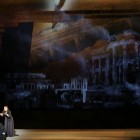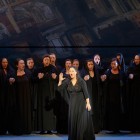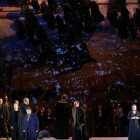Trojans 2014Mariinsky Opera, St Petersburg
Read more about the opera Troyens
Valery Gergiev's long-standing relationship with the Edinburgh International Festival has offered regular visits by his St Petersburg companies. We saw the fascinating King Roger and a couple of operatic concerts in 2008, while 2011 brought the gargantuan Strauss Frau ohne Schatten. Now with the Trojans we had another magnificent epic to round off the opera offering in the 2014 Festival. Gergiev drew wonderful playing from the orchestra, though the Berlioz sound we have become used to from others here was slightly different, more measured. Musically, it was all hugely enjoyable, underlining why this opera is considered so great.
Yannis Kokkos, as both director and designer, had worked with Scottish Opera several times, though not for a few years now. He previously directed The Trojans in Paris (2005), in a production conducted by John Eliot Gardiner. The set worked quite well, with a huge mirror spanning the stage, and giving the appearance of a larger playing area, with part of the floor able to open up as well. For Troy we saw a ground plan of streets, soon to be obliterated. For Carthage we had scale models of the new completed public buildings, with a huge staircase for Dido's final scene.
Costuming reflected the warring nations - all black for Troy, white for Carthage, although the principals, at least, were allowed some colour. A disappointment lay with some of the stagecraft. The principals generally acted well, offering plenty of detail to draw out character, but the chorus was directed to emphasise mass with little sense of the individual, echoing perhaps conventions of Greek drama. The dancing to celebrate the arrival of the horse (nothing dragged on, a massive head dominating) has been more impressive. The dancers on show were a squad of boys showing off their wrestling trainng, both in Troy and in Carthage. The famous sequence, The Royal Hunt and Storm, was evoked through striking images of stormy seas and film of a white horse (the hunt?) rather than the traditional ballet.
As with the Strauss, there were two casts alternating in some roles, and most of these singers were new to this reviewer - two of the men were in King Roger and Khudoley and Lutsyuk sang in Frau ohne Schatten. It was pleasing to see that several performers previously seen in small parts have since graduated to major roles. Chief of these, and the undoubted star of the second evening, was the young mezzo Yulia Matochkina. Her Dido was beautifully sung and acted in near-faultless French, a real creature of the stage - evoking comparison with Janet Baker.
Mlada Khudoley and Ekaterina Krapivina gave excellent performances as Cassandra and Anna. There were also particularly good contributions from Vladislav Sulimsky as Choroebus, Yury Vorobiev as Narbal and the sweet-toned young tenor Yevgeny Akhmedov as the home-sick sailor Hylas, opening the last act. The heroic tenor Viktor Lutsyuk, who sang Aeneas, and sings several big Wagner parts for the company, still has all the notes required, which is something, and he is an effective actor. But on 29th August at least he had lost the sweetness of tone that much of this music requires, being effective in his powerful narration of the death of Laocoön, but simply raw-toned later on.
Click on these striking images to expand them.
Performance Cast
- Cassandra a prophetess (Cassandre)
-
Ekaterina Gubanova (Aug 28, 30)
Mlada Khudoley (Aug 29)
- Ascanius son of Aeneas (Ascagne)
- Hecuba Queen of Troy, wife of Priam (Hécube)
- Aeneas a Trojan commander, son of Venus and Anchises (Énée)
-
Sergey Semishkur (Aug 28, 30)
Viktor Lutsyuk (Aug 29)
- Choroebus a young Asian, fiancé of Cassandra (Chorèbe)
-
Alexei Markov (Aug 28, 30)
Vladislav Sulimsky (Aug 29)
- Pantheus a Trojan priest and friend of Aeneas (Panthée)
- Ghost of Hector Priam's eldest son
- Priam King of Troy
- Trojan Soldier
- Greek Captain
- Helenus a Trojan priest, son of Priam
- Astyanax son of Hector and Andromache
- Dido Queen of Carthage, widow of Sichaeus, Prince of Tyre (Didon)
-
Ekaterina Semenchuk (Aug 28, 30)
Yulia Matochkina (Aug 29)
- Anna Dido's sister
- Narbal adviser to Dido
- Iopas a Tyrien minstrel at Dido's court
- Mercury Mercure
- Hylas a young Phrygian sailor
- First Soldier
- Second Soldier
- Ghost of Priam
- Ghost of Choroebus
-
Alexei Markov (Aug 28, 30)
Vladislav Sulimsky (Aug 29)
- Ghost of Cassandra











